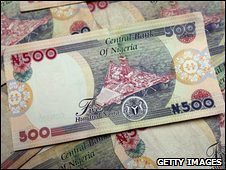
The Central Bank of Nigeria is seeking to resuce the financial sector in the oil-rich West African state. Executives of the top five banks were sacked while the suspension of trade was announced. a photo by Pan-African News Wire File Photos on Flickr.
Iringe-Koko: The IMF poisonous prescription for Naira
Wednesday, 09 March 2011 00:00
By Naphtali Iringe-Koko Opinion
Nigeria Guardian
I WILL start with a word about the IMF prescription; then what might be sensibly said about the economy and the things we should worry about. Currency devaluation is a conventional monetary instrument applied by a country to rebalance its economy to improve its competitiveness and expand its share of the world trade. In the process, exports will be boosted with a positive impact on the GDP. Rebalancing an economy is a short term measure to enhance competitiveness. It is mostly used by developed and balanced economies that are facing serious currency appreciation which in turn has made exports expensive and uncompetitive.
In the case of the naira, there is nothing to show that it is over valued. Over a decade ago the naira has consistently been depreciated by successive governments. Nigeria’s main export is crude oil, which accounts for 90% of export earnings. Nigeria depends heavily on imported goods which range from industrial to various household goods. It is not only about fuelling inflation or rising interest rates, and servicing of foreign denominated debts. It is about the quality of life for Nigerians. I believe any discussion about naira devaluation should be regarded as very sensitive. The naira is a store of value for an average Nigerian who does not own a foreign or domiciliary account. Devaluation automatically reduces that value plus the inflationary impact.
Usually a fall in local currency creates all sorts of economic problems such as fuelling inflation and rising interest rates. We should therefore tread very cautiously. The world body can advise but it is left to our economic managers to accept or not. Fortunately we have a listening President and a forward looking Central Bank Governor. During the 1997 Asian crises while South Korea and Thailand implemented IMF’s advice, Malaysia went ahead with its perceived solutions which were said to have produced faster economic recovery compared to South Korea and Thailand.
The depth of under-investment caused by lost decades of mismanagement has continued to impact negatively on the country’s development and its economy. The nation has suffered from chronic under investment in basic infrastructure coupled with unproductive devaluation policy which impeded the diversification of its narrow economic structure with crude oil accounting for 90% of export earnings. Despite our considerable natural resources endowments the country remains a low income country.
In the situation we find ourselves, restructuring the economy to balance it should be the way forward and not naira devaluation. The current investment programme launched by the President in the power sector is a huge plus in this direction. His aggressive power policy coupled with efficient fiscal policy should provide the enabling environment that will ensure that Nigerian companies are able to satisfy domestic demand and at the same time compete effectively in regional and international markets. This is the direction the IMF should be looking at by giving support to the Federal Government fiscal programme. In the Nigerian context, devaluation will look like a continuation of chasing a wild goose.
What we should worry about I believe are - the quality of FDI, skewed export earnings and the aftermath of IMF devaluation advice. FDI is very essential as it is part of development funds needed to drive any economy. We should not look at FDI in terms of quantity alone but also in terms of quality. It is necessary to be cautious in accepting FDI transactions which are not beneficial to the real economy. Speculative capital inflows as FDI without doubt could hurt the real economy. Productive FDI is one which flows into the Oil and Gas sector, Power sector, Agriculture, Infrastructure, Education, and Telecom etc.
We must guard against unproductive FDI such as speculative short term portfolio investments. Austria fully liberalised its capital account movements in 1991 when it was already one of the wealthiest and most stable economies in the world. Its capital account is said to have been liberalised only when its GDP per capita reached some USD 24,000.00. In 2010, Indonesia was said to have taken some modest temporary steps to impose modest constraints on short term investment inflows. There is no harm in temporarily applying some limited controls on speculative capital. The cancellation of class A bureau de change is a positive development in the right direction as it was open to abuse.
The concern in this area is related to the aftermath of the debate that will not go away easily. The IMF is one of the world’s most important and powerful multilateral organisations. Although its advice was not accepted due to practical reality, the debate will still go on. The naira market sentiment might change as the debate goes on. Naira may then become an easy prey for currency speculators believing that this issue may continue and that at some point in the near future, the CBN might cave in based on past experiences. This is an aspect that could also hurt the naira and the economy. However, I do not see this as a problem as this Government is committed to serve the interest of Nigerians and the “larger society”.
• Iringe-Koko is a chartered accountant.
No comments:
Post a Comment